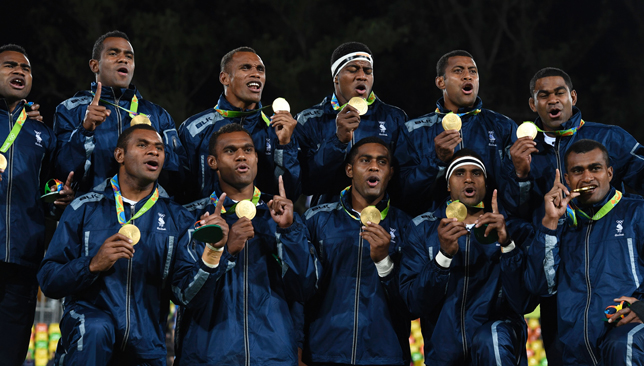
From Lautoka to Suva in the southern tip of the country, Fiji was sent into pandemonium as their men’s sevens team clinched a historic Olympic gold medal. People celebrated wildly on the streets and some businesses even closed temporarily to allow their employees watch the crowning moment as Fiji secured a first medal in 14 attempts at the Summer Games.
The victory gives the South Pacific Island of 881,000 a significant boost as the country still recovers from a cyclone that left 44 people dead and thousands homeless in February, including some of the players.
Coming to the big match, what impressed was the manner in which they brushed aside Great Britain in the final, scoring five unanswered tries to open up a commanding half-time lead. They duly upped the intensity in the second-half to win 43-7, with captain Osea Kolinisau showing glimpses of his terrific pace and ability to disrupt GB at the set piece.
Dominating from the outset of the tournament – where they were heavily tipped for glory – Fiji never looked in fear of being beaten, seeing off the challenges of Argentina, USA, New Zealand, Japan and then GB with ease.
At the helm of the team is Ben Ryan who will step down later this year after three years as head coach.
When the Englishman arrived in 2013, he was tasked with bringing a winning mentality to the South Pacific Island, developing the skillset and workrate to these naturally gifted athletes, some of whom first learnt how to play rugby using plastic bottles and flip-flops as balls.
He trains the team until they can’t run anymore and instructs his players to run at their opponents hard and fast, something that was evident during the Olympics when the Fijians looked unstoppable with ball in hand.
With two World Series titles and an Olympic gold medal to his name three years later, Ryan’s left a great legacy behind, achieving success that will be difficult to match going forward.
Sevens has left a positive mark in its first year as an Olympic event with its fast and exciting games making easy viewing for new fans
One of the critical decisions Ryan made in the build-up to Rio was the omission of Jarryd Hayne. The former rugby league star and San Francisco 49ers running back trained with the team for a year prior to the games, and was heavily tipped to be a key man for Fiji in Brazil.
For anyone who’s watched Hayne in action, leaving a man of his calibre out was a courageous decision by Ryan and further underlines the quality and talent in this glittering squad.
To watch players like Vaterno Ravouvo, Viliame Mata, Semi Kunatani and Leone Nakarawa sweep past opponents with ease and deliver deft passes is a joy as a rugby enthusiast. It’s not only their supreme fitness and skill levels, but also their intelligence on and off the ball that stands out.
Never been more proud to be from Fiji!! Yes our first gold. Can imagine all the cheers back home. Well done my brothers & @benjaminryan #Fij
— Roy Krishna (@RoyKrishna21) August 11, 2016
Nakarawa, in particular, embodies this colossal spirit. Three years ago, he was nearly denied a chance to play full-time rugby when Glasgow Warriors came chasing his signature. He didn’t fill out the proper paperwork when leaving the military and was brought into custody. A deal was made. If he led the Army team to victory in an important game they’d let him leave. He did, and has since developed into one of Fiji’s poster boys for rugby union and sevens.
As far as the event is concerned, sevens has left a positive mark in Rio in its first year as an Olympic event with its fast and exciting games making easy viewing for new fans. With fewer rules and each half only seven minutes, the sport has the ability to engage people whose interest in rugby may not be strong.
To have an event like this included in the Olympics gives these players a stage to demonstrate their vast array of skills and superb talents, especially Fiji whose national sport is sevens rugby.
With two World titles and an Olympic gold in three years, Fiji are an unassailable force in sevens and if they continue to operate at this towering level they’ll be difficult to stop at Tokyo 2020.